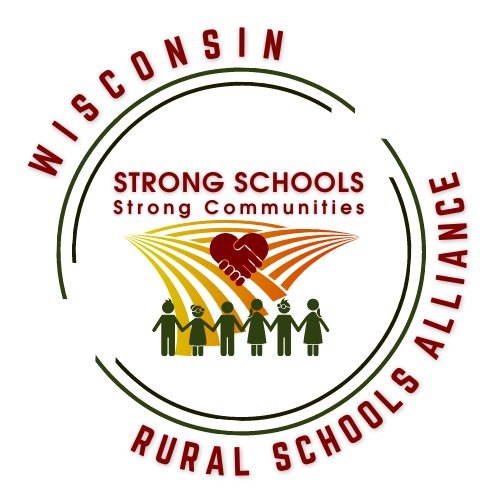WiRSA INFO
WiRSA Bylaws
WiRSA Board
WiRSA Map by Region
WiRSA Members
Why Join WiRSA
Become a Member
Membership Brochure
WiRSA Facebook
Rural/Town Map
Rural Definition & Maps
WiRSA Board Minutes
Quick Links
School Data Tools
WiRSA Update - February 28, 2024
The purposes of the Wisconsin Rural Schools Alliance (“WiRSA”) are to work collaboratively to solve issues pertinent to Wisconsin rural schools and communities in such as way as to ensure the engagement of all of the rural educational constituencies in developing and advocating for solutions to identified issues within our state. To collectively advocate on behalf of rural schools and their communities at the local, state, and federal levels. To be the voice for rural educational interests.
Announcements
WiRSA Conference - Request for Proposals
The WiRSA Planning Committee is seeking proposals for sessions that share best practices, solutions, and research in and outside our rural classrooms and schools.
WiRSA Conference - Vendor Information and Registration
WiRSA Conference - Silent & Live Auction Donations (Google Form Donation Link)
We will once again have a silent and live auction to support our WiRSA high school senior students and student-teacher scholarships. Responses can be adjusted if needed. Keep your URL link saved after you submit an auction item.
————————————————————————————————————————
WPEN (Wisconsin Public Education Network)
Celebrates their 10th Anniversary Party in Madison on Friday, March 1 (5-8 pm at the Findorff building - free parking!). Here is the INVITATION! (I hope to see you there)
————————————————————————————————————————
Highlights / Opportunity
WiRSA Student-Teacher Scholarships Recipients - We are thrilled to announce and congratulate the recipients of the WiRSA student-teacher scholarships. Your dedication to education and commitment to serving rural communities is truly commendable. We are excited to see the positive impact you will make as future educators in rural schools across Wisconsin.
—————————————————————————————————————DPI submits a list of recommended early literacy curricula to Joint Committee on Finance for approval
—————————————————————————————————————-
WiRSA Membership Highlights
WiRSA is highlighting our member’s incredible educational programs/opportunities in our WiRSA update. Highlighting these programs will continue to emphasize all the excellent educational opportunities in our rural and town schools, and it could also spark a collaborative discussion on what is possible. If you send me a short paragraph along with a flyer or short video, I will try incorporating that into my update.
Webster School District’s Tiger Tech information moved to our WiRSA Website.
(Check it out)
—————————————————————————————————————
COIL (Collaborative Online International Learning) FREE Opportunity.
Jodi Resch Brownell, our WiRSA Teacher of the Year, has been working on a state department COIL (Collaborative Online International Learning) grant project titled COIL Rural CommuniTIES. This year Jodi will be hosting a COIL workshop in Crandon (or virtually) in May.
————————————————————————————————————-
Legislative Update
Gov. Evers Press Releases
Gov. Evers Signs Bill Aimed at Bolstering State’s Workforce by Creating a Direct Admission Program for UW System
Gov. Evers Announces Support is Available for Many Northern Wisconsin Businesses Affected By Lack of Winter Snow
Gov. Evers, DWD Celebrate Success of New Youth Apprenticeship Child Care, Education Pathways
——————————————————————————————————————-——
Bill Information
The Assembly session is complete, and the Senate session is winding down.
I plan to have a list of education bills enacted and enrolled in my next update. I may send this out to the member school district in a separate email.
———————————————————————————————————-
News Articles
DOJ (Department of Justice) /WSCCA
AB1050 recently passed the assembly; however, SB955 must still pass the Senate before its adjournment in mid-March. The Office of School Safety will be able to continue critical operations to support our schools and keep our schools safe.
This funding extension would allow our DOJ to continue our work to proactively protect schools, prevent violence from occurring, mitigate trauma, and respond effectively to promote recovery if a crisis event does occur.
If you are interested in supporting our continued ability to do this important work, please contact your state senator and voice your support for SB955.
Update From NREA (National Rural Education Association)
The National Forum to Advance Rural Education is one of the country’s leading rural education conferences that brings together a diverse community of national experts, K–12 and higher education practitioners, leading researchers, policymakers, and philanthropic leaders in one spot. Present with us in Savannah (Proposals are due March 24)
Update From CEF (Center for Education Funding)
Appropriations – The Senate is back in session today and the House returns Wednesday with a deadline of midnight Friday to act on four of the eight appropriations bills whose funding expires at 12:01am on Saturday. Funding for the remaining eight bills, including the Labor-HHS-Education bill, expires a week later, after midnight on March 8. Congressional leaders had hoped to release a final package this weekend with funding for at least the first four bills, but they haven’t yet reached agreement. Both parties are blaming the other, citing disagreements on so-called policy riders as the main hangup, but hardline conservatives also are also looking for ways to cut spending any way they can. Some Republicans said they are fine if there is a partial government shutdown, although a shutdown costs money rather than saving it; since 2019, federal law requires backpay for all workers furloughed during a federal shutdown but the economic impacts ripple throughout the economy. A report by the Joint Economic Committee last year cites lost GDP, lower consumer confidence, and hits to private businesses that rely on federal services as fiscal consequences of government shutdowns. Senate Majority Leader Charles Schumer (D-NY) sent a Dear Colleague letter yesterday with some examples of impacts if Congress doesn’t continue funding after Friday night. President Biden plans to meet with the Democratic and Republican leaders of the House and Senate tomorrow to discuss the fiscal year (FY) 2024 appropriations and emergency supplemental foreign aid funding. Negotiators are keeping information closely held on the exact totals for each bill, as well as levels for programs and any earmarks for specific community projects. We likely won’t see any legislative text or the Statement of Managers (the report language explaining conferees’ intent that also includes a table of program funding levels) until shortly before Congress must vote on any packages of government funding bills. I’ll update CEF’s education funding table once we have that information but I don’t expect that information for the Labor-HHS-Education bill until next week at the earliest.
Pell Grant proposals and funding – This week the House is scheduled to consider a bill expanding Pell grant eligibility to short-term training programs and paying for that with a controversial “offset” that affects a specific group of about 35 non-profit universities. There’s also conversation bubbling around about the cost of the Pell grant program and how quickly its current reserve funding will be depleted.
Workforce Pell – The House has added HR 6585, the Bipartisan Workforce Pell Act, to the list of bills to be considered on the suspension calendar this week, meaning it will require support of two-thirds of those voting to pass. The bill has been modified since it was marked up, and a new version of the bill pays for the additional program costs via a new offset that requires only universities subject to the endowment excise tax to reimburse the Department of Education for amounts not repaid on federal student loans. Some support the goals of the bill but not the source of the additional funding; the original offset would have ended eligibility for student aid to students attending institutions subject to the endowment excise tax.
Potential future Pell grant shortfall – CEF members will soon get a briefing by the Congressional Budget Office (CBO) on the uniqueness of Pell grant funding and how the current reserve in the program has been used to pay for other education programs in recent years; we have the briefing scheduled for March 22 during the Friday meeting, but it may occur earlier. In the last week, there’s been press attention and rumors about how that reserve (also known as the surplus) is quickly going to be used up. The most recent CBO estimate from May 2023 forecast a surplus of $12.2 billion based on FY 2023 funding levels and estimated eligible applicants. Last week the Committee for a Responsible Budget (an organization that advocates for fiscal responsibility and generally wants to cut federal spending) wrote a blog post saying that the Pell grant surplus would be exhausted in FY 2026 based on a couple of big assumptions: that program costs increase by $4 billion for FY 2024 (last year’s CBO estimate showed costs increasing by $2 billion and then growing slowly) and continue to increase thereafter, and that Congress freezes new funding going forward, which Congress has done for years. Separately, I’ve heard rumors that the Administration will soon estimate that Pell grant program costs will use up the reserve funding quickly. I have been assuming that, as it has for each of the last five years, Congress will rescind some of the previously appropriated Pell grant funding (which is what comprises the reserve) in the FY 2024 Labor-HHS-Education bill and then use that funding on other programs in the bill. This tactic doesn’t impact the bill’s bottom line, since the funding is first subtracted from the bill’s total spending as a rescission, and then added back for a different program. Rescissions of prior Pell grant funding in the last five years have ranged from a low of $360 million in FY 2023 to a high of $1.0 billion in FY 2022 but totaled $1.3 billion in FY 2017. The tight spending constraints for FY 2024 could lead Congress to rescind a large amount of the Pell grant reserve in the upcoming bill, which would jeopardize the program in future years and would eliminate it as a source of funding for other programs.
U.S. Department of Education News
Biden-Harris Administration Releases Resources to Support Preschool Expansion and Early School Success
Thank You!
WiRSA 2023
Conference Sponsors








